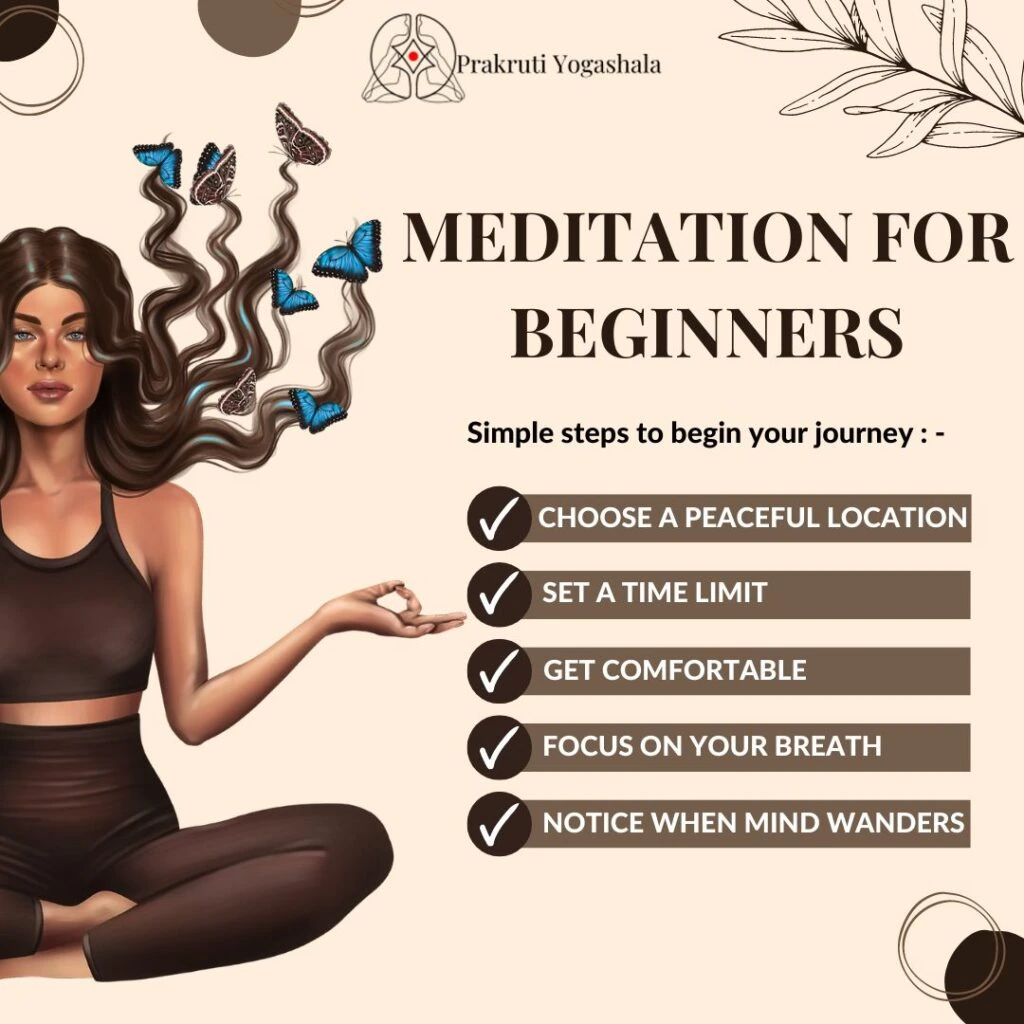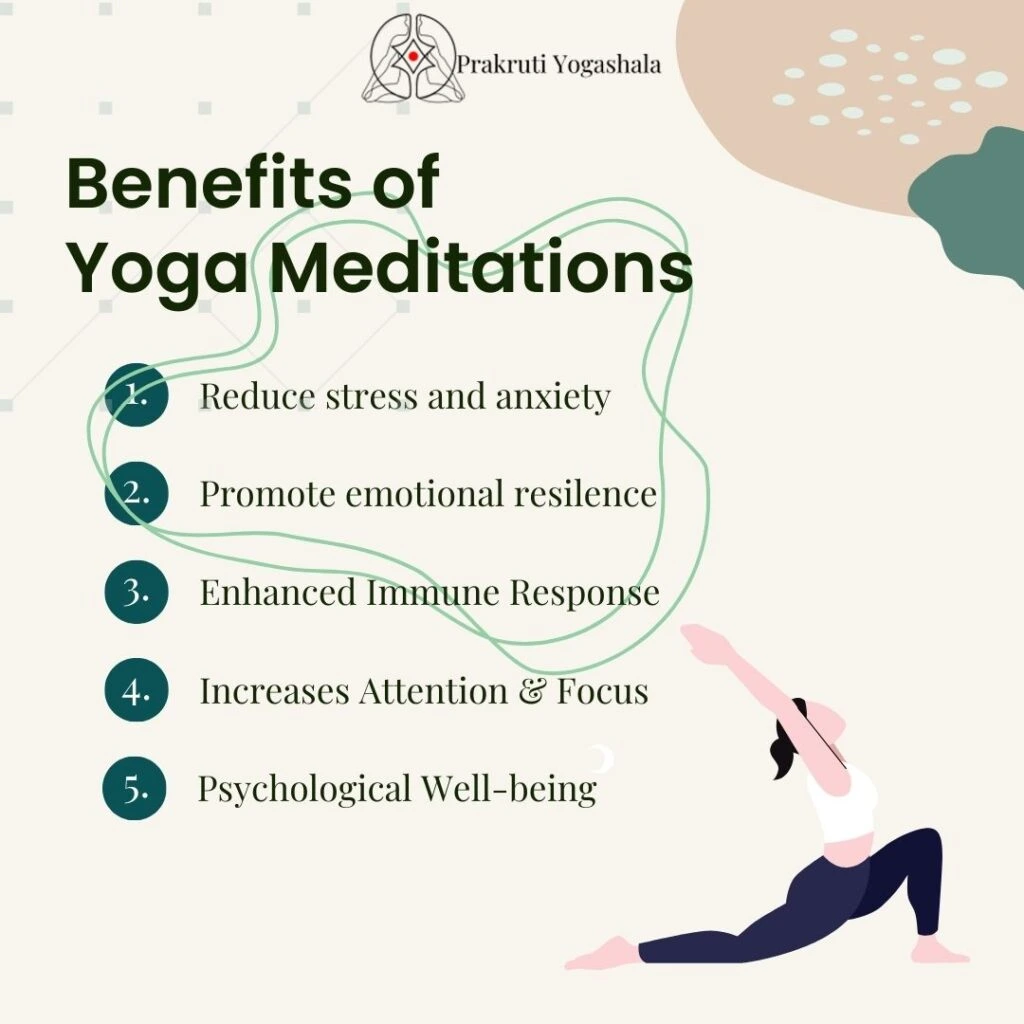Nestled in the foothills of the Himalayas, Rishikesh is not just a scenic beauty but also a spiritual enclave, where the ancient practice of yoga meditation thrives. At Prakruti Yogsahala, we embrace the sacred tradition of yoga meditation, its transformative power, guiding countless seekers on their journey toward inner peace and physical well-being. This article explores the profound benefits and power of yoga meditation, especially how it differs from meditation alone, and offers guidance on starting this transformative practice in Rishikesh.
How is Yoga Different from Meditation?
Yoga and meditation are often intertwined, yet they stand distinct in their practices and benefits. Yoga, originating from the Sanskrit word “Yuj,” means to unite or integrate. It’s a comprehensive discipline involving physical postures (asanas), breathing techniques (pranayama), and meditation (dhyana). Yoga aims to harmonize the body, mind, and spirit, promoting physical flexibility and mental clarity.
Meditation, or Dhyana, however, is primarily a mental practice. It involves focusing the mind and becoming mentally clear emotionally calm and stable. Meditation practiced within yoga is about mindfulness and awareness, deeply rooted in the present moment, which can lead to profound experiences of peace and contentedness.
How to Start Meditation for Beginners
Starting a meditation practice can feel daunting at first, but it’s remarkably accessible. Here are simple steps to begin your journey, particularly tailored by Prakruti Yogsahala:
- Choose a Peaceful Location: Rishikesh, with its serene environment by the Ganges, provides an ideal backdrop. At home, find a quiet corner that is free from distractions.
- Set a Time Limit: Start small, with just 5-10 minutes a day, and gradually increase the duration as you get more comfortable.
- Get Comfortable: Use a yoga mat or cushion for seating. Ensure your back is straight yet relaxed.
- Focus on Your Breath: Feel the natural flow of your breath—in, and out. Don’t control the breath but observe it.
- Notice When Your Mind Wanders: It’s natural for your attention to wander. Gently return your focus to your breathing.
- End with Kindness: When you finish, open your eyes slowly and take a moment to notice how you feel. Gradually get up.

The Biological and Neurological Impacts of Meditation
Meditation is not just a tool for mental relaxation but also a scientifically proven method to enhance biological functioning:
- Neuroplasticity: Meditation increases the brain’s ability to form new connections and change its structure. Regular practice can thicken the prefrontal cortex, improving attributes like concentration and decision-making.
- Stress Reduction: It decreases the production of stress-related hormones like cortisol and increases neurotransmitter levels that promote well-being such as serotonin.
- Enhanced Immune Response: By reducing stress, meditation can improve your body’s immune functioning, making you less susceptible to illness.

Benefits & Power of Mindfulness Yoga Meditation
Mindfulness meditation encourages you to observe wandering thoughts as they drift through your mind. The intention is not to get involved with the thoughts or judge them, but simply to be aware of each mental note as it arises.
- Psychological Well-being: Regular practitioners report higher levels of life satisfaction and lower tendencies towards depression and anxiety.
- Increased Attention: It enhances the brain’s ability to pay attention and stay engaged in tasks for longer periods without distraction.
- Emotional Resilience: Emotional stability improves, with practitioners experiencing enhanced equilibrium in mood and overall behavior.
Frequently Asked Questions (FAQs) related to Yoga Meditation Power
Q1: How often should I practice yoga meditation to see the benefits?
A: At Prakruti Yogsahala, we recommend starting with at least three sessions per week, each lasting 20 to 30 minutes. Consistency is key to achieving significant benefits.
Q2: Can meditation improve physical health?
A: Yes, meditation can positively impact physical health by reducing stress, enhancing respiratory function through better breathing techniques, and improving cardiovascular health.
Q3: Are there any age restrictions for starting meditation?
A: Meditation is beneficial for all age groups. At Prakruti Yogsahala, we tailor techniques that are appropriate for different ages and physical conditions.
Q4: How does meditation affect my everyday life?
A: Regular meditation enhances mental clarity, reduces stress levels, improves concentration, and promotes a greater sense of peace and well-being, which can profoundly impact daily living.
In conclusion, the power of yoga meditation in Rishikesh offers a unique blend of spiritual upliftment and physical health benefits, making it a perfect choice for those seeking a profound, life-changing experience. At Prakruti Yogsahala, we are committed to fostering a supportive community where each individual can thrive through the practice of yoga meditation.